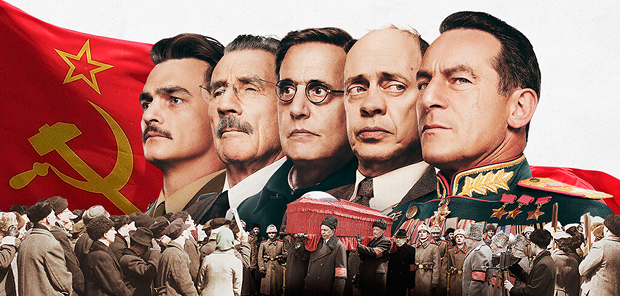 I didn’t see this eccentric, pitch-black, savagely funny satire about the death of the Soviet dictator when it was out in the cinemas, but I’m glad I had a chance to watch it at home. Or rather my Mum’s home, since I don’t do streaming.
I didn’t see this eccentric, pitch-black, savagely funny satire about the death of the Soviet dictator when it was out in the cinemas, but I’m glad I had a chance to watch it at home. Or rather my Mum’s home, since I don’t do streaming.
Confession: whenever Hollywood or anyone non-Russian period makes a film about Russia, I always have to overcome a massive cringe in order to watch it, and just get used to the notion that everything about it will look and sound “wrong” to me. The Death of Stalin however is so outlandishly over-the-top and stylised that its lack of authenticity wasn’t an issue in the slightest, nor the fact that none of the British/US cast attempt to affect a Russian accent and speak as they normally do. I suspect that a more straightforward drama about the same events probably wouldn’t go down as well.
The opening scenes give a perfect taste of the fear and paranoia of the times, and the film’s balancing act of comedy and cruelty. A live performance by an orchestra and the famous pianist Maria Yudina on Radio Moscow attracts Stalin’s attention, and he asks for a recording to be sent to his dacha pronto. The only problem is, no recording was made, and cold-sweat panic ensues. The concert has to be restaged; random people from the street are forcibly pulled in to fill in the auditorium so that no sound variation is detected; the pianist, who loathes Stalin, refuses to play until she’s offered a huge sum for her troubles; a last-minute replacement for the conductor gets a knock on the door late at night, and assumes at first that he’s to be arrested. “Don’t worry,” the station director reassures the audience, “nobody’s going to get killed.”
Soon after getting the recording, Stalin is paralysed by a cerebral haemorrhage and eventually shuffles off this mortal coil. The bulk of the movie is then taken up by the power struggle between the members of the Central Committee in the wake of Stalin’s death, depicted as an absurdist and biting mix of slapstick, one-liners, intrigue, backstabbing, grandiose Kremlin interiors and glimpses of the brutal underbelly of the regime.
The biggest showdown soon shapes up to be between Beria (Simon Russell Beale), the fiendish head of the secret police, and Nikita Khrushchev (Steve Buscemi), who while not exactly sympathetic is perhaps the least awful and progressive-minded one of the lot. I’d definitely never put Steve Buscemi and Khrushchev in the same sentence, but it’s an effective and fun casting, as is Michael Palin playing Molotov and Jeffrey Tambor as wishy-washy Malenkov, Stalin’s heir apparent. Later in the film, Jason Isaacs adds his hilariously preening, tough-guy take on Marshal Zhukov to the excellent ensemble.
Director Armando Iannucci does a brilliant job juggling the unsettling and hilarious, with wickedly funny results. The film may play fast and loose with the real-life facts, but like any great political satire, it feels like it comes from a place of truth.


Very silly and dark. Nice review.
LikeLike